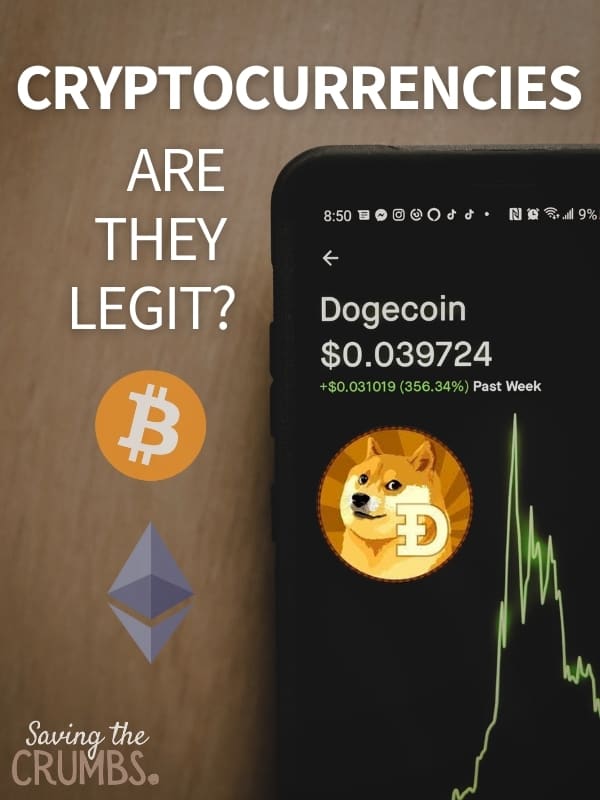Dogecoin cost just $.004857 at the start of 2021. (Yes, that’s less than one cent.) It reached a then all-time-high of over $.40 in mid-April, then promptly took a dive of 50% to around $.20, but then rallied to another all-time high of over $.70 in early May. That represents a gain of 14,000% in less than 5 months, with massive +50% corrections along the way. (At the time of this writing, it dropped about 30% immediately following Elon Musk’s namedrop of Doge in his Saturday Night Live appearance which triggered a crash in the largest Dogecoin crypto trading platform, Robinhood.)
So is Dogecoin going to the moon?* (Colloquialism meaning if Doge’s price will explode to $1 or beyond?) What about cryptocurrencies in general? Is it all a scam? Or are we witnessing a civilization-altering revolution that represents an investment opportunity of a lifetime?
Since cryptocurrencies are in the news every day and on everyone’s mind, here are some of my musings on the subject. What follows is one man’s opinion and should not be construed to be financial advice!
Are they a legitimate asset class?
As a class, I believe that cryptocurrencies are legitimate assets. But that’s like saying that stocks are a legitimate asset class. It does not mean that all stocks or cryptocurrencies are sound, but simply that I can’t dismiss them out-of-hand as a whole. Neither does this constitute an endorsement that everyone should run out and invest in cryptocurrencies. As with most things in life, it’s a bit more complex than that.
It should go without saying that not all cryptocurrencies are created equal. There are the big players like Bitcoin and Ethereum, which are likely to stand the test of time, and then there are the other 90% of coins that will probably go to zero. The crypto industry has only existed a little more than 10 years, and even in that time, countless coins have come and gone into oblivion. I suspect that in the not-too-distant future, many of the coins that are hyped up “to the moon” today and subject to the speculative pump and dumps of hundreds of percents will likewise go bust. Those afflicted with FOMO (fear of missing out) who are tempted to pile into these euphoric bubbles, beware!
Bitcoin: Digital Gold
Any discussion about cryptocurrencies must begin with Bitcoin, the grandaddy of them all. Invented by the pseudonymous Satoshi Nakamoto, Bitcoin and the blockchain brought to reality the ability to have a decentralized and trustless manner of transferring value. This notion is incredibly powerful and revolutionary. Whether we invest in Bitcoin or cryptocurrency at all, I genuinely believe that blockchain technology will alter our way of life in the coming decades much like the internet did in the past few decades.
Without getting overly philosophical or technical, I believe in the thesis of Bitcoin being a digital store of value like gold. The recent adoption of Bitcoin by large institutions like Tesla and MicroStrategy on their balance sheets is both a corroboration and catalyst of this thesis. Moves like this by big players build confidence in the digital asset, and ultimately confidence is what gives value to assets—even assets like fiat currency and gold.
So in light of this, I believe it is reasonable to consider holding (hodl?) some Bitcoin in a well-diversified investment portfolio. In theory, it seems likely that Bitcoin will function as a hedge against inflation due to its built-in scarcity, whether it actually behaves that way is yet to be proven. But with the rampant money printing by central banks around the world, we may not have long to find out!
Having said all of this, I also recognize that Bitcoin has far too short of a history to have any long-term track record. The S&P 500 has over a century of history, whereas Bitcoin is barely a teenager. Will it grow to match/exceed gold’s market capitalization? Is it already topped out? Will it retrace 85% like it did back after the 2017 bubble? Will the volatility and gains flatten out in the future? Will the market cycles continue to coincide with the 4-year halvings into the future? I’ve got my own personal opinions about these things, but let’s be honest, no one really knows for sure. There are so many unknowns that anyone who invests in Bitcoin better be ready for a wild ride.
Ethereum, Smart Contracts, and Digital Oil
If Bitcoin is digital gold, then Ethereum and other smart contract platforms are digital oil. Gold is a store of value that people hold, whereas oil is the fuel that makes entire economies run.
Ethereum and other smart contract platforms do to the blockchain what Javascript did for the web. In short, it unlocks its potential. Smart contract platforms enable decentralized applications to be built that will change the game in how value can be transferred seamlessly online with little friction and increased security. This isn’t just about money anymore, but things like titles, deeds, intellectual property, credentials, insurance, and anything of value. And due to its decentralized, borderless nature, it could be the key to economic opportunity for the underprivileged in the developing world. (If you want just a taste of what is coming, look up Charles Hoskinson and what Cardano is doing in Africa.)
The native tokens on these platforms (like Ether for Ethereum) are required to pay literal “gas fees” to make the whole system run. The built-in economics creates an incentive structure for the disparate agents in the decentralized network to behave and creates a self-governing mechanism which protects the integrity of the platform. This utility gives these tokens intrinsic value as the platforms are used. This system of incentives is a key reason why blockchains can operate without a centralized authority.
There is a veritable arms race in the smart contract space right now with dozens of competing visions, and who knows which platforms will ultimately win out? In this regard, I’m reminded of the 2000 dot-com bubble. Everyone knew that the internet was going to be revolutionary, but no one could predict which companies would ultimately win. Out of the thousands of companies that went bust, Amazon survived and has become the behemoth that it is today. That’s the same with the smart contract wars right now. No one really knows who will be “Amazon.com” and who will be “Pets.com”, 10-20 years from now.
Stablecoins: The (Likely) True Digital Currencies
One of the original visions of Bitcoin was that it would become a global digital currency for actual payments and transactions. With gold no longer really viable as a form of currency, it seems unlikely that Bitcoin could fulfill both roles of being a digital store of value as well as a global currency. (How would you feel now if you were the person who paid 10,000 Bitcoin for two pizzas back in 2010?) To that end, I think payments and transactions will more than likely be filled by stablecoins or something like them. Stablecoins are tokens, generally issued on a smart contract platform like Ethereum, that are pegged to a fiat currency. For example, 1 USD Coin (USDC) is backed by exactly $1 USD, and there is no price volatility like other cryptocurrencies. (In fact, Visa has announced that they will be settling transactions using the USDC stablecoin, which incidentally runs on the Ethereum blockchain.)
From an investment perspective, there are numerous high-interest stablecoin savings account-type products that offer vastly higher interest (as much as +10% APY) than typical fiat-based savings accounts. They, for better or for worse, spare us the extreme volatilities of the crypto markets. Just beware, these accounts do come with their own unique set of risks and they are not FDIC insured.
Other Altcoins
Then there are all the other thousands of cryptos that each have their own use cases besides these. The industry is going through rapid expansion with new players every day. Some of them will turn into winners, most of them will fail and disappear.
What about Dogecoin?!
So that brings us to Doge. Dogecoin is what’s known as a memecoin, which means it was literally started as a joke. Its meteoric rise was almost entirely driven by social media and celebrity notoriety (ahem, Elon Musk). Take a look into its tokenomics and you will see that it has no cap on total supply, meaning an unlimited number of new Dogecoin can be created in the future. This makes it just as inflationary as cash, which is opposite of the whole point of Bitcoin.
Perhaps of greater concern is that the social media-fueled frenzy around Doge is inflating what I fear is a real bubble. Unsuspecting victims are lured to FOMO-buy at the top when all their friends are hyping up how much their Doge has pumped. They’ll be hoping for a trip to the moon, but will more than likely be left holding the bag when the people who bought in at $.01 or below cash out at their expense. This is precisely the type of activity that can bring heavy regulator scrutiny, which may ultimately stymie the broader, legitimate innovation in the industry.
I’ll admit it, I am not big a fan of Doge (apologies to the Dogefather) but even despite that, I must acknowledge that it is yet possible for it to become an actual transactional currency. Because of its inflationary nature, it can function much like a fiat currency or stablecoin (albeit with volatility) and is less likely to be hoarded like a non-inflationary asset like Bitcoin. In fact, Mark Cuban’s Dallas Mavericks have been accepting it as payment recently, and indications suggest that it’s been quite popular. If enough institutional adoption picks up, then anything is possible. But just because something is possible doesn’t mean it’s a good investment.
Or who knows, maybe the next memecoin like SHIBA INU will show up to eat its lunch? (Seriously, that’s a thing.)
Legitimate Asset Doesn’t Equal Recommended Investment
In case you can’t tell, I am very bullish on cryptocurrencies overall as a technology and in the promise of blockchain. (Memecoin silliness, notwithstanding.) I am excited to see the innovations that will come out of this technological revolution, and I believe they are absolutely a legitimate asset class.
However, just because a technology or asset class is legitimate doesn’t mean it is a good investment for everyone. I’ll be honest, in its current state it is tough for me to recommend it to most lay investors. Besides some of the reasons I’ve mentioned above, here are some other challenges that I see:
- Volatility – The volatility in the crypto market is absolutely stomach-turning. 30-40% drops in one day are not uncommon, and it can give indigestion even to seasoned investors. Most lay investors will most likely not be able to handle that kind of turbulence and will lose a lot of sleep and money.
- Regulatory Uncertainty – The lack of clear regulations on cryptocurrencies make the future of cryptos somewhat uncertain. It can create a lot of problems if governments decide to crack down with a heavy hand. Case in point, Ripple Labs, creator of the XRP token got into some legal hot water with the SEC not long ago.
- Taxes – The tax implications of crypto is very complicated and difficult to manage for the ordinary lay investor. And investors are absolutely expected to pay taxes on crypto earnings. It is easy to get completely hammered by taxes if not careful.
- Too Much Noise – There’s just a lot of sensationalism and noise surrounding crypto. With every YouTuber and Redditor shilling their preferred coin and conflicts of interest abounding everywhere, it’s treacherous out waters there. It’s easy to get caught up in the FOMO, in the speculative moonshots, and in the unvarnished greed. It can also stir the appetite to gamble.
- Pitfalls Everywhere – There are 1,001 ways to lose money in crypto that have nothing to do with the coins going down in value. And unfortunately, most people will have to learn hard way. Just a few examples: You can lose everything if sending coins to the wrong address or using the wrong network, you can lose everything if you forget your private key or seed phrase, there are a ton of “gas fees” or transaction fees for all sorts mundane actions which can completely wipe out the small investor, DeFi smart contract developers who promise massive returns can make off with your money in “rug pulls”, those smart contracts can also get hacked, even exchanges (where most new investors store their coins) can be hacked, and the list goes on and on.
- Steep Learning Curve – Crypto right now requires a lot out of its users. Investors have to learn how to maintain their own crypto wallets, they have to maintain 2-factor authentication on all their accounts, they have to be able to know the difference between the gobbledygook wallet addresses for different coins and blockchains, etc. If you’re like me, and have people in your life who still have trouble figuring out how to get video conferencing to work, how to configure FaceID on their iPhones, or how to come up with strong, unique passwords instead of reusing the same one over and over again, then you will understand why it feels kinda irresponsible to recommend crypto investing to many people!
A Measured Approach
Having said all of this, if people want to start learning about cryptocurrencies and are willing to put in the time and energy, I’m certainly not going to stop them. Here are a few considerations for those who are willing to take the plunge:
- Never invest in something (or coin) you don’t understand. Take the time to learn what you’re getting into, and always be aware of your downside risk. If you don’t have time for that, it’s better to invest in other more time-proven investments and let someone else FOMO into coins and be left holding the bag. Ultimately you are responsible for the consequences of your own actions.
- Diversify a small portion of your portfolio into this asset class. Start with a few percentage points. Invest only what you are willing and able to forfeit. Don’t go all in. And if you lose money (plan on it), consider it a tuition cost for an education. (No better school that the school of hard knocks, they say.)
- If you have a lump sum to invest, rather than dumping it all in at once, dollar cost average over time to help smooth out the volatility.
- Have reasonable expectations and control your emotions. Let’s face it, crypto investing is alluring because of the potential for massive gains. But we get into trouble when we aim to get-rich-quick, become greedy, and react emotionally. The disciplined investor is patient, controls his emotions, understands risk vs. returns, and manages his expectations accordingly. (A side note on expectations, the crypto millionaires that you hear about almost certainly got into the market when the prices were in the dumpster. Buying in near market tops is not likely to earn you the same types of returns.)
- Absolutely do not get into leveraged trading or trading on margin. The volatility of crypto coupled with the magnification effect of leverage is the recipe for a complete wipeout. I’ve heard estimates that over 90% of traders who use leverage lose money, it’s not hard to see why.
- Speaking of debt, don’t dabble in crypto investing if you still have outstanding high-interest debt. Counting on your crypto earnings to pay back your loans is only compounding your risk and can get ugly very quickly. Do things in the right order. Paying off your debt is almost always your best investment, and then consider crypto investing after that.
- Have a plan for taxes. Crypto investors are required to pay taxes on their earnings. So before you go trigger happy trading back and forth between coins as they go up in value, be aware that you will be responsible for calculating, reporting, and paying any taxes that you owe. Depending on your holding time, you could be on the hook for short-term or long-term capital gains taxes. If not careful, your massive crypto payday may turn into a tax-time nightmare. There are services out there to help you with crypto taxes, but none of them are free.
- If you want to start conservatively, you might consider looking into earning interest on stablecoins. There are numerous services that make it easy to earn as much as 10% or more on stablecoins. These are like high-interest savings accounts, except without the FDIC insurance. There are also many DeFi (decentralized finance) applications that provide interest on your holdings without a centralized player, but those come with a higher learning curve and potentially prohibitively high transaction (gas) fees. Again, you will need to do your own research and make sure you know what you are doing.
Wrapping Up
I am genuinely excited about the future of blockchain and cryptocurrencies. I believe there will be breakthrough innovations from this technology that will change the world. However, I am more measured in cryptocurrency as an investment. It is a legitimate asset class that is worthwhile to consider in a diversified portfolio, but I believe as things currently stand, it takes a special breed of investor to be able to manage it. Cryptocurrency investing is not for the faint of heart, and that elevated risk is also why there are outsized rewards for those who are able to navigate it. Whether you decide to invest in cryptos is ultimately your own personal decision, but always remember that there are worse things than missing out on the latest craze like Dogecoin.
*Elon vows to put a literal Dogecoin on the literal moon, and SpaceX will be launching a satellite named DOGE-1 to the moon, which will be paid for with Dogecoin. You can’t make this stuff up.






